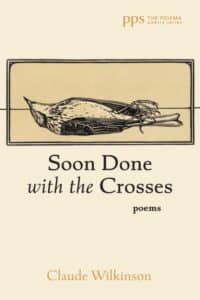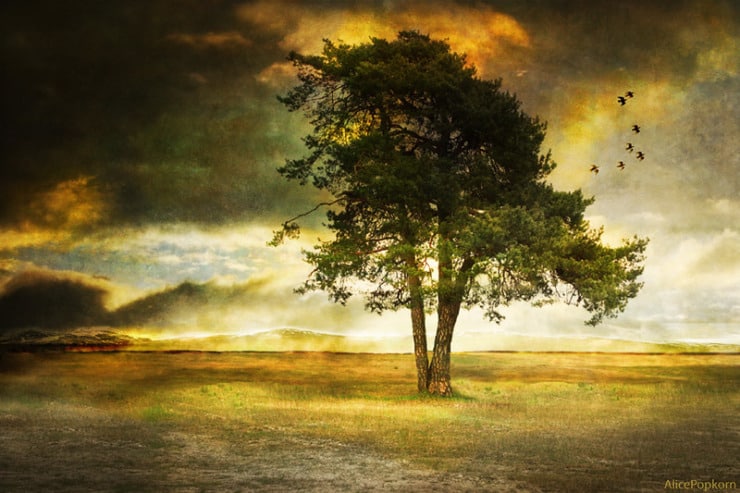
Claude Wilkinson considers the burdens we bear
In his fourth collection of poetry, World Without End, Claude Wilkinson considered the wonder of everyday objects and events, finding meaning in things we see and often look right past because, well, they’re so common and expected. Wilkinson stopped, looked, and considered whether he had been missing something. And he had.
In his 2023 collection, Soon Done with the Crosses, Wilkinson retains that idea of finding meaning in the everyday, then applies it to the questions that seem to be increasingly haunting us. Why is there so much growing anger and hate? Why is there a growing intolerance for others’ opinions and beliefs? How have we come to objectifying people we disagree with, considering them “the other”?
Here’s how he asks these questions:
Logos

is not good, so I ask myself how
can scarlet and hyacinth macaws
still tolerate one another
on the same clay lick, and the same
of lakes bearing mayflies and loons?
How is it the stars and moon
yet sleep and wake together
in peace after these many millennia,
and why by now hasn’t Saturn seceded
from its crowning glory of rings?
In the hot, blue August noon
and green, sinuated shade of pin oaks
is some of Heraclitus’s strife and change,
the earth burning itself up in a phoenix-flame
to revive again from ash. I’m thinking
of Hopkins being torn between loves:
the cosmos of Duns Scotus and Ignatius Loyola,
“inscape” and “instress” more often at odds
than at rest, while another of my backyard’s
little dramas unfolds as to how it all works.
From an abandoned armadillo hole,
a chipmunk peeps, quivers as if
hearing a hawk’s famished skirl,
then scampers a few feet
toward groves heightened
with late summer’s light, but then
stops, quivers, and darts back to his pit
over and over till I too bear the burden
of his life, feel the heart thump
under an ivory-plumed breast
perched somewhere atop
this deciduous world,
timing its quick descent.
Wilkinson might have titled this poem “Logos, or the Burden of the Chipmunk.” He describes a recognizable world in nature, and he indirectly compares it to the world inhabited by humanity. What are scarlet and hyacinth macaws but allusions to the red-blue political divide? The sun and the moon have co-existed peacefully for billions of years, yet humanity seems bent on destroying itself at least once a generation. He notes that this afflicts poets as well, with the reference to Gerard Manley Hopkins torn between the philosophies of Duns Scotus and Ignatius of Loyola. The natural world, even with its predators and prey, seems to function within a natural order; Saturn has considered seceding from its rings.
The 60-some poems of the collection mirror similar themes. Wilkinson turns his eyes to snails and seahorses, the vole and the opossum, the Tennessee walking horse and the cicada, and to other animals. He’s suggesting the natural world has an order and a harmony that seems to have vanished in the human world.

Claude Wilkinson
The poems focused on humans and human events continue that theme, like the lyceum marker commemorating James Meredith’s enrollment at the University of Mississippi in 1962, or a group of soldiers eating together at a steakhouse in Grenada, Mississippi. He suggests that we need to consider there is more that could be in this constant bickering and animosity of the human condition. Yet it seems to be the burden he and we carry with us.
Wilkinson is a writer, poet, critic, and artist. He received degrees from the University of Mississippi and the University of Memphis, and he has served as provost and writer in residence at the University of Mississippi. His poetry collections include Reading the Earth (1998), Joy in the Morning (2004), Marvelous Light (2018), World Without End (2020), and Soon Done with Crosses (2023). His poems and writings have been published in numerous anthologies and literary journals, including Atlanta Review, Blue Mesa Review, California State Poetry Quarterly, Oxford American, Southern Review, and Xavier Review, among others. He lives in Nesbit, Mississippi, near Memphis, Tennessee.
The poems of Soon Done with the Crosses (the title is borrowed from a spiritual performed by the Georgia Sea Island Singers) don’t answer the questions of why this human life is the way it is, but they remind us that the questions have not been answered. They have a traditional sense of reporting about them, reporting stories and allowing the readers to reach their own conclusions.
Related:
Claude Wilkinson and World Without End
Photo by Cornelia Kopp, Creative Commons, via Flickr. Post by Glynn Young.
How to Read a Poem uses images like the mouse, the hive, the switch (from the Billy Collins poem)—to guide readers into new ways of understanding poems. Anthology included.
“I require all our incoming poetry students—in the MFA I direct—to buy and read this book.”
—Jeanetta Calhoun Mish
- Poets and Poems: Alison Blevins and “Where Will We Live if the House Burns Down?” - July 1, 2025
- Poets and Poems: Paul Pastor and “The Locust Years” - June 26, 2025
- What Happened to the Fireside Poets? - June 24, 2025


Leave a Reply